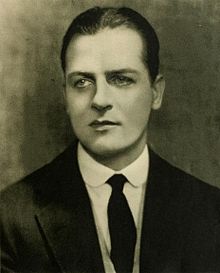Reginald Denny (actor)
| Reginald Denny | |
|---|---|

Reginald Denny in Stars of the Photoplay, 1924
|
|
| Born |
20 November 1891 Richmond, London, Surrey, England, United Kingdom |
| Died | 16 June 1967 (aged 75) Richmond, London, Surrey, England, United Kingdom |
| Occupation | Actor, aviator |
| Years active | 1915–1966 |
| Spouse(s) | Betsy Lee (1928–1967); 3 children Irene Haisman (1913–1928; divorced); 1 child |
Reginald Leigh Denny (20 November 1891 – 16 June 1967) was an English stage, film and television actor as well as an aviator and UAV pioneer. He was once an amateur boxing champion of Great Britain.
Born in Richmond, London, Surrey, England, Denny (sources differ on his birth name giving variously Reginald Daymore,Reginald Leigh Daymore and Reginald Leigh Dugmore Denny), but listed in birth records as Richard Leigh Dugmore, began his stage career at age seven in The Royal Family and in The Merry Widow at age 16, the year he left St. Francis Xavier College, Mayfield, Sussex. Years later he joined an opera company as a baritone, and toured India. After continuing his stage career in America, his film career started in 1915 with the old World Film Company and he made films both in the United States and Britain until the 1960s. He came from a theatrical family which went to the United States in 1912 to appear in the stage production Quaker Girl. His father was the actor and singer W.H. Denny. Reginald appeared in John Barrymore's 1920 Broadway production of Richard III; the two actors became friends.
Denny was a well-known actor in silent films and with the advent of talkies, he became a character actor. He played the lead role in a number of his earlier films, generally as a comedic Englishman in such works as Private Lives and later had reasonably steady work as a supporting actor in dozens of films, including The Little Minister (1934) with Katharine Hepburn, Anna Karenina (1935) with Greta Garbo, Alfred Hitchcock's Rebecca (1940) and the Frank Sinatra crime caper film Assault on a Queen (1966). His last role was in Batman (1966) as Commodore Schmidlapp. He made frequent appearances in television during the 1950s and 1960s.
...
Wikipedia
